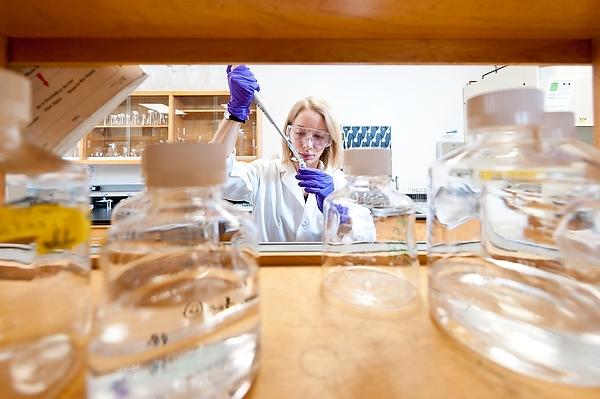A federal bill pushes for advances in stem cell research by creating a Standards Coordinating Body, which would determine safe standards for medicine.
Sen. Tammy Baldwin, D-Wisconsin, author of the bill, said in a statement it is important to improve standards for regenerative medicine of because advances in this field can save lives.
Regenerative medicine is the umbrella term used to describe procedures that replace or regrow human cells, tissue or organs to restore normal function, according to Mayo Clinic.
“Regenerative medicine holds incredible potential to give us lifesaving therapies for serious diseases,” Baldwin said in the statement. “But, the lack of collaboration on standards development today is a huge obstacle as we work to boost the development of these advanced therapies.”
The coordinating body would enable more efficient and successful development for regenerative medicine and other advanced therapies for patients, according to the statement.
University of Wisconsin is one of the leading institutes of regenerative medical research in the world, Randolph Ashton, a UW biomedical engineering professor, said.
William Murphy, co-director of UW’s Stem Cell and Regenerative Medicine Center, said right now, the public isn’t using regenerative medicine but it is ready for human trials.
Murphy said since this field is quickly developing, passing this bill will provide a streamlined process for UW researchers to make new advances.
There are currently no FDA standards in place to determine whether or not regenerative medicine is safe for use, Ashton said. A lack of standards could result in fatal damage to the patient being treated, he added.
Sen. Fred Risser, D-Madison, supports Baldwin’s bill and said it’s important for laws to keep up with new developments in medicine.
“Regenerative Medicine is new and evolving very, very fast, if we don’t get a handle on it, it might get out of control,” Risser said.
Risser said the bill would push for federal agencies, standards organizations and other stakeholders to find a consensus for the standards required in validating regenerative medicine.
The nature of regenerative medicine therapy, Ashton said, would not only allow scientists to replace cells that patients need to recover, but also allow testing of diseases like Parkinson’s disease outside of the patient’s body, while searching for applicable treatment. Such advancement in technology would help scientists to cure diseases from the root of their causes, rather than relying on drugs to treat the symptoms, he added.
Ashton said it is important for there to be universal standards in place to make sure products are safe because any organization can fund research in regenerative medicine.
“We can define it, it just takes effort and consensus,” Ashton said. “They (Baldwin) want the government to take an active role in facilitating these standards.”
Ashton said one reason some might oppose this legislation is because of the connection between regenerative medicine and fetal tissue research. But he said advances in technology have made it so regenerative medicine does not actually require fetal tissue.
But Ashton said having access to fetal tissues would still provide scientists gold standards to which they can compare the regenerative therapies.
Chelsea Shields, Wisconsin Right to Life spokesperson, said in an email to the Badger Herald that Wisconsin Right to Life supports advances in regenerative medicine, but not if advances come at the cost of using fetal tissue from abortions.
“Wisconsin Right to Life rejoices with any scientific advances that help save lives, but cannot condone the use of abortion-derived fetal tissue or embryonic stem cells in our research industry,” Shields said in a statement emailed to the Badger Herald. “There are always ethical and effective alternatives of abortion-derived fetal tissue or embryonic stem cells, and we encourage any measures that promote these lifesaving ethical alternatives.”
Dan Miller, state director of Pro-Life Wisconsin, said stem cell research is acceptable as long as cells were obtained ethically, not through an abortion. He said it would be acceptable to obtain cells through a miscarriage if the patients gave consent.
Baldwin said in the statement she hopes this bill will connect stakeholders together to best determine the appropriate standards for this field.
“I’m proud to introduce this legislation that will help facilitate coordination and leadership as we address the most acute needs for standards and best practices,” Baldwin said.
The bill is currently seeking support in the Senate.


